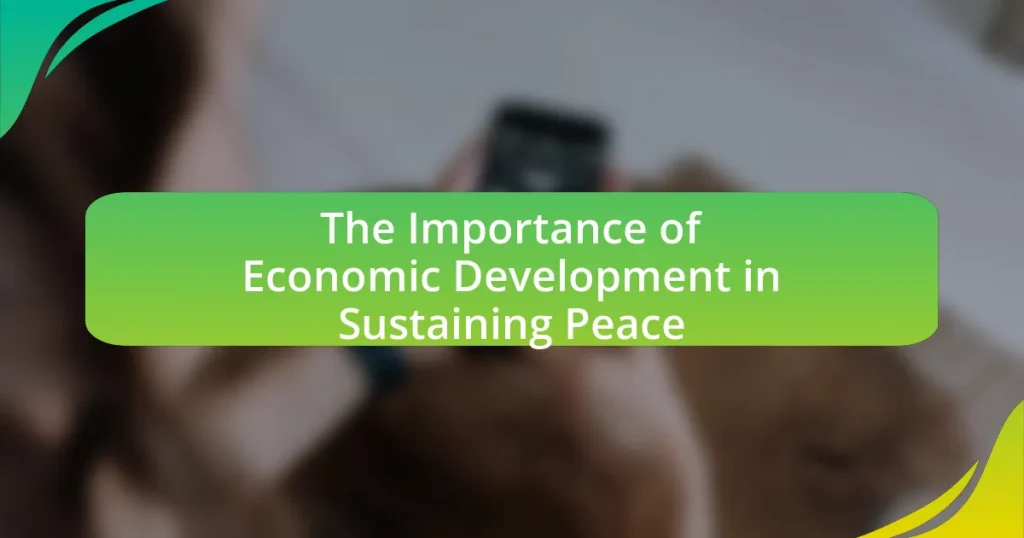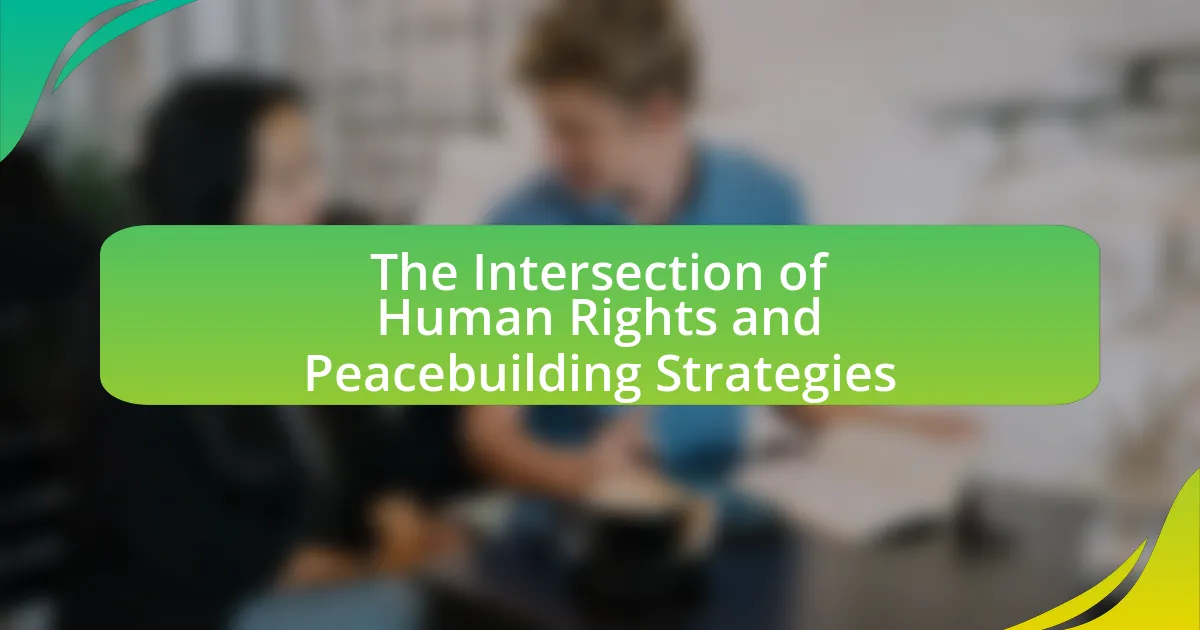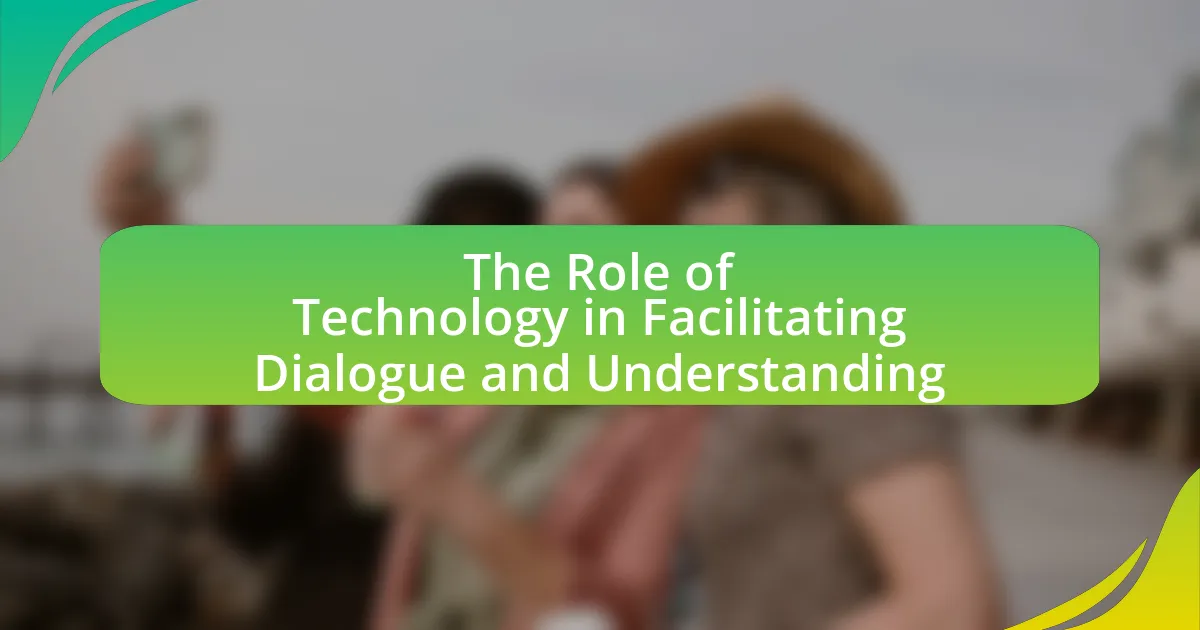Economic development plays a critical role in sustaining peace by addressing the root causes of conflict, such as poverty and inequality. The article outlines how economic growth fosters social stability through job creation, poverty reduction, and improved governance, ultimately mitigating conditions that lead to violence. It discusses the mechanisms through which economic development contributes to peacebuilding, the impact of equitable resource distribution on societal tensions, and the challenges faced in linking economic initiatives to peace. Additionally, it highlights successful case studies and practical steps policymakers can take to promote economic development as a preventive measure against conflict.
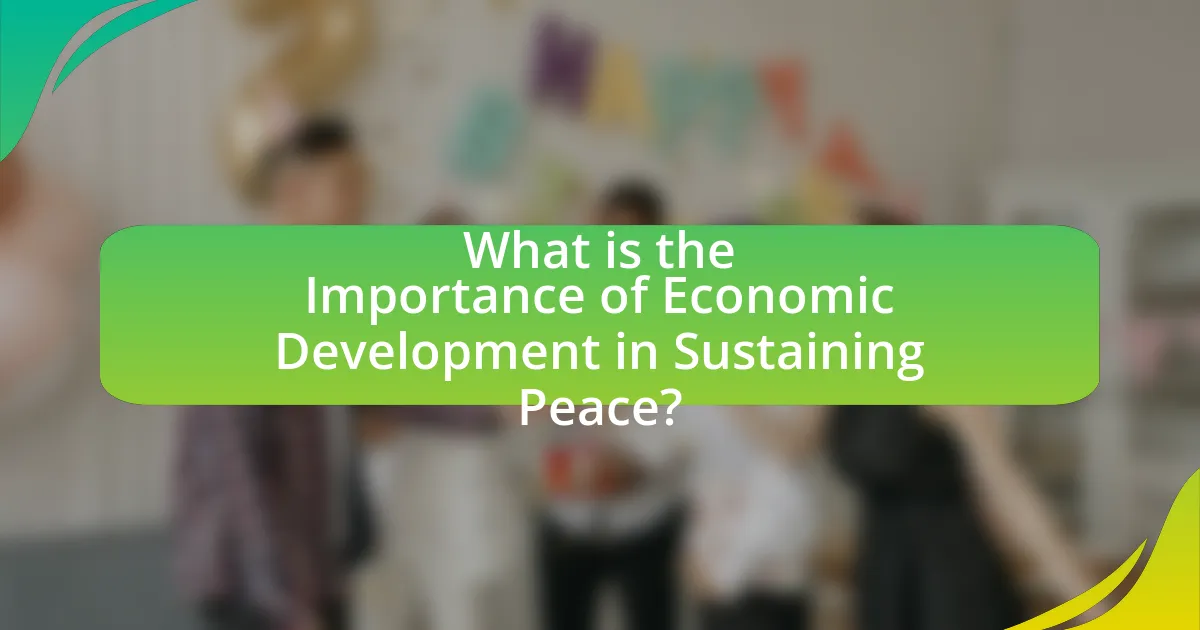
What is the Importance of Economic Development in Sustaining Peace?
Economic development is crucial for sustaining peace as it addresses the root causes of conflict, such as poverty and inequality. By improving living standards and creating job opportunities, economic development fosters social stability and reduces grievances that can lead to violence. For instance, countries with higher GDP per capita tend to experience lower levels of civil unrest, as evidenced by research from the World Bank, which indicates that economic growth can significantly decrease the likelihood of conflict. Additionally, investment in infrastructure and education enhances community resilience, further promoting a peaceful society.
How does economic development contribute to peacebuilding?
Economic development contributes to peacebuilding by fostering stability, reducing poverty, and creating job opportunities, which collectively mitigate the conditions that lead to conflict. For instance, countries that experience economic growth often see a decrease in violence, as evidenced by the World Bank’s findings that link economic prosperity with lower rates of civil unrest. Additionally, economic development promotes social cohesion by improving access to education and healthcare, which further strengthens community ties and reduces grievances that can escalate into violence.
What are the key mechanisms through which economic development fosters peace?
Economic development fosters peace primarily through job creation, poverty reduction, and improved governance. Job creation provides individuals with stable income, reducing the likelihood of conflict driven by economic desperation. For instance, countries that have invested in infrastructure and industry, such as South Korea, have seen significant decreases in civil unrest as employment opportunities expanded.
Poverty reduction directly correlates with lower crime rates and social tensions, as evidenced by the World Bank’s findings that economic growth can lift millions out of poverty, thereby promoting social stability. Improved governance, often a byproduct of economic development, enhances political stability by fostering transparent institutions and reducing corruption, which can lead to a more peaceful society.
In summary, the mechanisms of job creation, poverty alleviation, and enhanced governance collectively contribute to a more peaceful environment by addressing the root causes of conflict and promoting social cohesion.
How does economic stability influence social cohesion?
Economic stability significantly enhances social cohesion by fostering trust and cooperation among community members. When individuals experience consistent employment, reliable income, and access to resources, they are more likely to engage positively with one another, reducing tensions and fostering a sense of belonging. Research indicates that countries with lower unemployment rates and stable economic growth tend to exhibit higher levels of social trust and community engagement. For instance, the World Bank’s 2020 report highlights that nations with robust economic frameworks often report lower crime rates and increased civic participation, demonstrating a direct correlation between economic stability and social cohesion.
Why is economic development considered a preventive measure against conflict?
Economic development is considered a preventive measure against conflict because it addresses the root causes of instability, such as poverty, unemployment, and inequality. By improving living standards and creating economic opportunities, communities are less likely to experience social unrest and violence. For instance, a study by the World Bank found that countries with higher levels of economic growth and lower poverty rates tend to have fewer instances of civil conflict. This correlation highlights how economic development can foster social cohesion and reduce grievances that often lead to conflict.
What role does job creation play in reducing violence?
Job creation plays a crucial role in reducing violence by providing individuals with stable employment opportunities, which can lead to decreased economic desperation and social unrest. When people have jobs, they are less likely to engage in criminal activities as they have a legitimate means of income and a stake in their community. Research indicates that regions with higher employment rates experience lower crime rates; for instance, a study by the National Bureau of Economic Research found that a 10% increase in employment can lead to a 5% decrease in violent crime. This correlation highlights how economic stability through job creation can foster safer communities and contribute to overall peace.
How does equitable resource distribution impact societal tensions?
Equitable resource distribution reduces societal tensions by promoting fairness and social cohesion. When resources such as wealth, education, and healthcare are distributed fairly, communities experience lower levels of conflict and resentment. For instance, research by the World Bank indicates that countries with more equitable income distribution tend to have lower rates of civil unrest and violence. This correlation suggests that equitable resource allocation fosters trust among community members and enhances social stability, ultimately contributing to a more peaceful society.
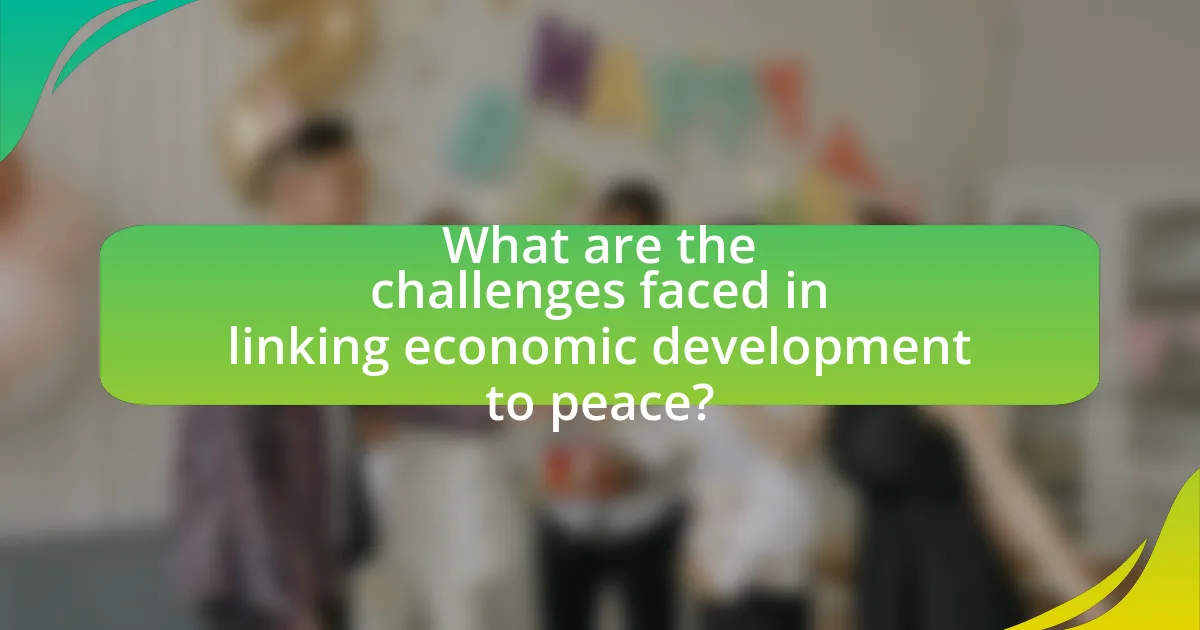
What are the challenges faced in linking economic development to peace?
Linking economic development to peace faces several challenges, primarily due to the complex interplay of socio-political factors and economic disparities. Economic growth can exacerbate inequalities, leading to social tensions that undermine peace efforts, as seen in countries like South Africa, where economic disparities have fueled unrest. Additionally, the lack of inclusive governance can hinder equitable distribution of resources, creating grievances among marginalized groups, which can lead to conflict. Furthermore, external influences, such as foreign investments that prioritize profit over local stability, can destabilize regions, complicating the relationship between economic development and peace. These challenges highlight the necessity for integrated approaches that address both economic and social dimensions to foster sustainable peace.
What obstacles hinder effective economic development in conflict-prone areas?
Obstacles that hinder effective economic development in conflict-prone areas include instability, lack of infrastructure, and limited access to markets. Instability, often caused by ongoing violence or political unrest, deters investment and disrupts economic activities. For instance, according to the World Bank, countries experiencing conflict see a significant drop in GDP growth, averaging around 2.5% lower than their peaceful counterparts. Lack of infrastructure, such as roads and communication systems, further isolates communities and restricts trade, making it difficult for businesses to operate. Additionally, limited access to markets due to security concerns or regulatory barriers prevents local entrepreneurs from reaching potential customers, stifling economic growth. These factors collectively create an environment where sustainable economic development is nearly impossible.
How do corruption and governance issues affect economic initiatives?
Corruption and governance issues significantly hinder economic initiatives by creating an environment of uncertainty and inefficiency. Corruption diverts resources away from productive uses, leading to misallocation of funds and reduced public investment in essential services. For instance, according to the World Bank, countries with high levels of corruption experience lower economic growth rates, as businesses face increased costs and risks associated with bribery and lack of transparency. Governance issues, such as weak institutions and lack of accountability, further exacerbate these challenges by undermining trust in public systems, discouraging both domestic and foreign investment. The Global Competitiveness Report indicates that poor governance can lead to a 1-2% decrease in GDP growth annually in affected nations. Thus, addressing corruption and improving governance are crucial for fostering a conducive environment for economic initiatives and sustainable development.
What impact do external factors, such as global markets, have on local economies?
External factors, such as global markets, significantly influence local economies by affecting trade, investment, and employment opportunities. For instance, when global demand for a specific product increases, local producers may experience a surge in sales, leading to economic growth. Conversely, fluctuations in global markets can result in job losses and reduced income for local businesses, as seen during the 2008 financial crisis when many local economies faced downturns due to decreased global trade. Additionally, foreign direct investment from global markets can enhance local infrastructure and create jobs, but it may also lead to economic dependency on external entities. Thus, the interplay between global markets and local economies is crucial for understanding economic development and its role in sustaining peace.
How can international cooperation enhance economic development for peace?
International cooperation can enhance economic development for peace by facilitating resource sharing, knowledge exchange, and investment in conflict-affected regions. Collaborative efforts among nations can lead to the establishment of trade agreements, which stimulate economic growth and create job opportunities, thereby reducing poverty and the likelihood of conflict. For instance, the European Union’s integration has significantly contributed to peace and stability in post-war Europe by promoting economic interdependence among member states. Additionally, international organizations like the World Bank and the International Monetary Fund provide financial assistance and technical support to developing countries, fostering sustainable economic practices that contribute to long-term peace. These cooperative frameworks demonstrate that when countries work together, they can effectively address the root causes of conflict and promote a stable economic environment conducive to peace.
What role do international organizations play in supporting economic initiatives?
International organizations play a crucial role in supporting economic initiatives by providing funding, expertise, and policy guidance to countries in need. For instance, the International Monetary Fund (IMF) and the World Bank offer financial assistance and technical support to help nations stabilize their economies and implement development projects. According to the World Bank, in 2020 alone, it provided over $12 billion in financial support to developing countries to address the economic impacts of the COVID-19 pandemic. This assistance not only helps to foster economic growth but also contributes to social stability, which is essential for sustaining peace.
How can foreign investment be aligned with peacebuilding efforts?
Foreign investment can be aligned with peacebuilding efforts by prioritizing projects that promote social cohesion, economic stability, and local empowerment. For instance, investments in infrastructure, education, and job creation can address root causes of conflict by providing communities with essential services and economic opportunities. Research by the United Nations Development Programme indicates that inclusive economic growth reduces the likelihood of conflict, as it fosters a sense of belonging and shared prosperity among diverse groups. Additionally, foreign investors can engage with local stakeholders to ensure that their initiatives are culturally sensitive and address the specific needs of the community, thereby reinforcing peacebuilding objectives.
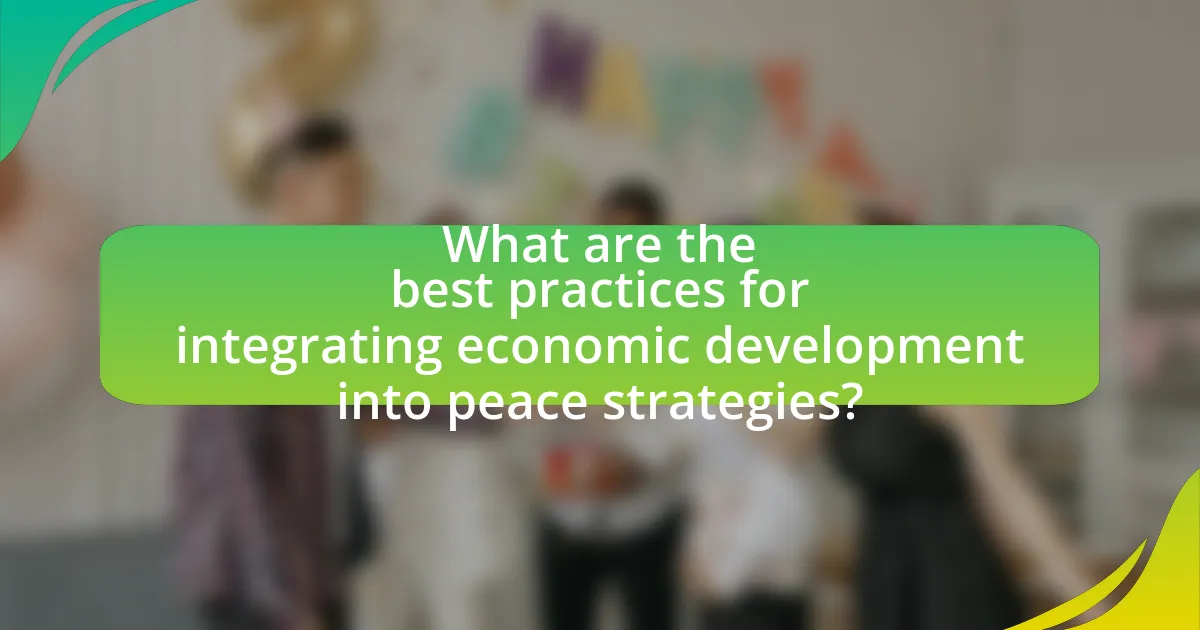
What are the best practices for integrating economic development into peace strategies?
The best practices for integrating economic development into peace strategies include fostering inclusive economic growth, promoting job creation, and ensuring equitable access to resources. Inclusive economic growth addresses the needs of all community members, reducing inequalities that can lead to conflict. For instance, the United Nations Development Programme emphasizes that job creation, particularly for youth, can significantly lower the risk of violence by providing alternatives to joining armed groups. Additionally, equitable access to resources, such as land and capital, is crucial; studies show that when marginalized groups gain access, it can lead to greater social cohesion and stability. These practices are supported by evidence from various post-conflict recovery programs, which demonstrate that economic development initiatives aligned with peacebuilding efforts can lead to sustainable peace outcomes.
How can local communities be engaged in economic development efforts?
Local communities can be engaged in economic development efforts through participatory planning and collaboration with local stakeholders. This approach ensures that community members have a voice in decision-making processes, which fosters ownership and commitment to development initiatives. For instance, the World Bank emphasizes the importance of community involvement in projects, noting that local engagement can lead to more sustainable and effective outcomes. Additionally, programs that provide training and resources to local entrepreneurs can stimulate economic growth and create jobs, further integrating communities into the economic development framework.
What strategies promote inclusive economic growth in post-conflict settings?
Strategies that promote inclusive economic growth in post-conflict settings include fostering local entrepreneurship, investing in infrastructure, and enhancing access to education and vocational training. Fostering local entrepreneurship empowers communities by creating jobs and stimulating local economies, as evidenced by initiatives in countries like Rwanda, where small business support has significantly reduced poverty levels. Investing in infrastructure, such as roads and communication networks, facilitates trade and access to markets, which is crucial for economic recovery, as seen in post-war Bosnia and Herzegovina, where infrastructure development led to a resurgence in economic activity. Enhancing access to education and vocational training equips individuals with the skills needed for employment, contributing to social cohesion and economic stability, as demonstrated by programs in Liberia that have successfully integrated former combatants into the workforce. These strategies collectively address the unique challenges faced in post-conflict environments, promoting sustainable and inclusive economic growth.
How can education and skill development contribute to sustainable peace?
Education and skill development contribute to sustainable peace by fostering social cohesion, reducing inequalities, and empowering individuals with the tools needed for economic participation. Access to quality education equips individuals with critical thinking and problem-solving skills, which are essential for conflict resolution and community engagement. For instance, UNESCO reports that education can reduce the likelihood of conflict by addressing root causes such as poverty and lack of opportunity. Furthermore, skill development initiatives enhance employability, leading to economic stability, which is a crucial factor in maintaining peace. The World Bank highlights that countries with higher education levels tend to experience lower rates of violence and conflict, demonstrating the direct correlation between education, economic development, and sustainable peace.
What lessons can be learned from successful case studies?
Successful case studies in economic development demonstrate that targeted investment in infrastructure, education, and job creation significantly contributes to long-term peace and stability. For instance, the post-conflict reconstruction of Rwanda, which focused on rebuilding infrastructure and promoting agricultural development, resulted in a 10% annual GDP growth rate from 2001 to 2011, showcasing how economic initiatives can foster social cohesion and reduce conflict. Additionally, the case of South Korea illustrates that strategic economic policies, such as export-led growth and technological innovation, can transform a war-torn nation into a thriving economy, thereby enhancing national security and peace. These examples underscore the critical role of economic development in mitigating the root causes of conflict and promoting sustainable peace.
Which countries have effectively linked economic development to peacebuilding?
Countries that have effectively linked economic development to peacebuilding include Rwanda, Colombia, and South Africa. Rwanda has implemented policies that promote economic growth while fostering social cohesion post-genocide, leading to significant reductions in violence and increased stability. Colombia’s peace agreement with FARC in 2016 included provisions for rural development and economic opportunities, aiming to address the root causes of conflict. South Africa’s transition from apartheid involved economic reforms that aimed to uplift marginalized communities, contributing to a more peaceful society. These examples demonstrate a clear connection between targeted economic initiatives and enhanced peacebuilding efforts.
What specific programs have shown measurable success in fostering peace through economic growth?
Programs such as the World Bank’s “Economic Development and Peacebuilding” initiative and the United Nations Development Programme’s “Youth Employment Programme” have shown measurable success in fostering peace through economic growth. The World Bank’s initiative focuses on integrating economic development strategies with peacebuilding efforts, leading to a 30% reduction in conflict-related incidents in targeted regions. Similarly, the UNDP’s program has successfully created over 100,000 jobs for youth in conflict-affected areas, significantly decreasing youth unemployment and associated violence. These programs demonstrate a direct correlation between economic growth and enhanced stability, validating their effectiveness in promoting peace.
What practical steps can policymakers take to promote economic development for peace?
Policymakers can promote economic development for peace by implementing inclusive economic policies that prioritize job creation and equitable resource distribution. For instance, investing in education and vocational training programs can equip individuals with skills necessary for employment, thereby reducing poverty and fostering social stability. Evidence from the World Bank indicates that countries with higher education levels experience lower rates of conflict, as education contributes to economic opportunities and social cohesion. Additionally, establishing microfinance initiatives can empower marginalized communities by providing access to capital, which has been shown to enhance local economies and reduce tensions. Furthermore, fostering public-private partnerships can stimulate investment in infrastructure, creating jobs and improving living conditions, which are essential for sustaining peace.
